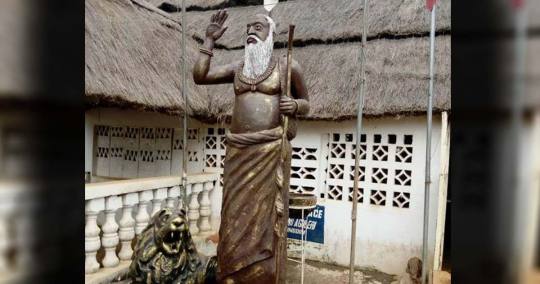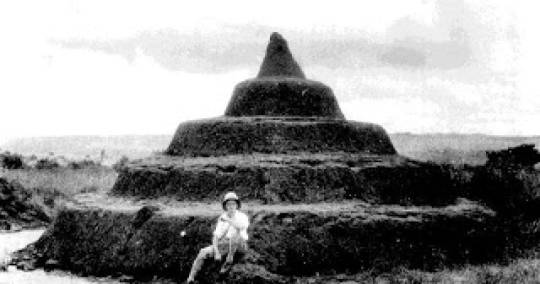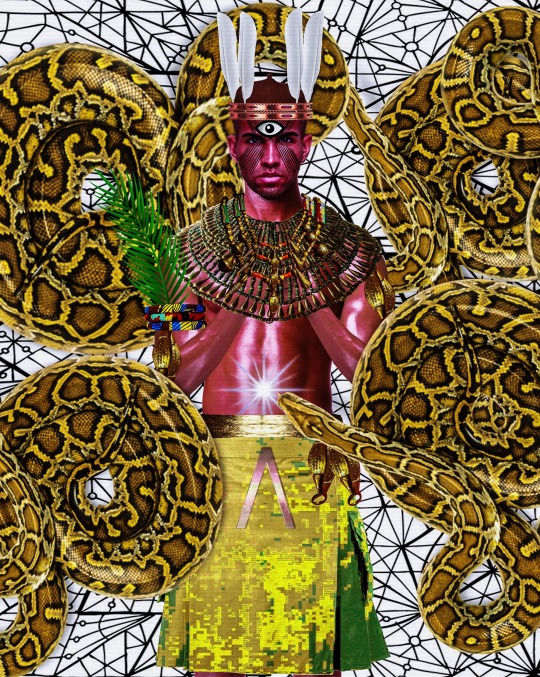#Umunri
Explore tagged Tumblr posts
Photo



Eri is said to be the original legendary cultural head of the Umu-eri groups of the Igbo people. Eri established a community in the middle of Anambra river valley (at Eri-aka) in Aguleri where he married two wives. The first wife, Nneamakụ, bore him five children. The first was Agulu, the founder of Aguleri (The ancestral head of Eri Kingdom clans) (the Ezeora dynasty that has produced 34 kings till date in Enugwu Aguleri), the second was Menri, the founder of Umunri / Kingdom of Nri, followed by Onugu, the founder of Igbariam and Ogbodulu, the founder of Amanuke. The fifth one was a daughter called Iguedo, who is said to have borne the founders of Nteje, and Awkuzu, Ogbunike, Umuleri, Nando and Ogboli in Onitsha. As one of the children of Eri, Menri migrated from Aguleri, which was and still is, the ancestral temple of the entire Umu-Eri (Umu-Eri and Umu-Nri). His second wife Oboli begot Ọnọja, the only son who founded the Igala Kingdom in Kogi State.
Eri is the founder of the Umueri and Umunri clans, both of whom were some of the most influential and powerful dynasties of priests and diviners in Igboland and adjacent areas such as the Bini and Igala/Idoma areas

When Eri was sent by Chukwu from the sky to the earth, he sat on an ant-hill because he saw watery marshy earth. When Eri complained to Chukwu, Chukwu sent an Awka blacksmith with his fiery bellows and charcoal to dry the earth. After the assignment, the Awka blacksmith was given ọfọ as a mark of authority for his smithing profession. While Eri lived, Chukwu fed him and his people with azu-igwe. But this special food ceased after the death of Eri. Nri, one of his sons, complained to Chukwu for food. Chukwu ordered Nri to sacrifice his first son and daughter and bury them in separate graves. Nri complied with it. Later after three Igbo-weeks (12 days) yam grew from the grave of the son and coco yam from that of the daughter. When Nri and his people ate these, they slept for the first time; later still Nri killed a male and a female slave burying them separately. Again, after Izu Ato, an oil palm grew from the grave of the male slave, and a bread fruit tree (ukwa) from that of the female-slave. With this new food supply, Nri and his people ate and prospered. Chukwu asked him to distribute the new food items to all people but Nri refused because he bought them at the cost of sacrificing his own children and slaves. Nri and Chukwu made an agreement. According to M. D. W. Jeffreys (1956:123), a tradition has it that:
"As a reward for distributing food to the other towns, Nri would have the right of cleansing every town of an abomination (nso) or breach, and of tying the Ngulu (ankle cords) when a man takes the title of ozo. Also he and his successor’s would have the privilege of making the Oguji, or yam medicine, each year for ensuring a plentiful supply of yams in all surrounding towns, or in all towns that subjected themselves to the Eze Nri. For this medicine all the surrounding towns would come in and pay tribute and Umunmdri people then could travel unarmed through the world and no one would attack or harm them"
Another legend holds that Eri was one of the seven sons of Gad, who was himself one of the twelve sons of Jacob. He left the area together with his brothers Areli and Arodi and settled in the west bank of the Niger river in the present Anambra state, where Eri had a son called Aguleri who became the father of most of the Igbo clans
#african#igbo#eri#aguleri#eze#ngulu#ukwa#nri#izu#umunmdri#king#negus#chukwu#african culture#igbo culture#brown skin#africa#alaigbo
13 notes
·
View notes
Text
предание Игбо говорит, что происхождение людей началось в Игболенде, когда Бог (Chukwu) сотворил первых людей Eri и его жену Nnamaku и послал их на землю (в Aguleri). От этих людей произошли первые кланы Игбо — Umueri и Umunri. Как гласит Предание Игбо, Бог некогда был близок к людям, но затем вознесся на небо, так как женщина имела обыкновение тыкать своим пестиком в небо при измельчении её foofoo поздно ночью и это волнение вынудило Бога отдалиться. Поэтому возникли такие выражения Игбо, как: Mmadu bu chukwu a na afu anya n’uwa (Человек — Бог в мире) и Madu bu chi ibe ya (Человек — Бог другому человеку). Оба выражения подразумевают, что люди также могут иметь большую жизненную роль, влияя на судьбы других.
Чего нахер какой пестик какой foofoo
2 notes
·
View notes
Photo

Nawfia Umunri Clan - Izaga Masquerade of Nwafia Umunri Clan Country: Nigeria || Language: Igbo || Style: Igbo traditional music https://open.spotify.com/album/07OC1UiGzZThpRzwrepnfK
0 notes
Text
Igbo urged to return to communalism (Okonkwo)
Igbo urged to return to communalism (Okonkwo)
A political economist, Dr Obiora Okonkwo, yesterday, urged the Igbo nation to return to the old structure of communalism in the renewed bid to develop the South-East region.

He made this submission while delivering a lecture titled: Ndigbo in Contemporary Nigeria: Social, Cultural, Political, and Economic Reflections, at the 5th annual Umunri Colloquium of Enugwu-Ukwu community held at the…
View On WordPress
0 notes
Text
Igbo Water Divinities
River gods and goddesses are found wherever a significant river or waterbody is found in Igboland, some of the more powerful cults cover larger areas and command more respect and followers by the importance of the waterbodies. Often of fluid gender, the water spirits are powerful ‘images’ of sexuality, fertility, beauty, and wealth and power. The most powerful water spirits are listed.

[Map of major rivers linked to divinities within Igboland]
Ńjābá
Ńjābá is so powerful among southern and specifically southwestern Igbo communities that he outranks Àlà, the Earth Mother, in these communities. Ńjābá is usually male and is the guardian of the river of the same name that is a major tributary of Ụ́gwụ́tá (Oguta) Lake in Imo State, Nigeria. Éké, the royal python, is sacred to Ńjābá and surrounding communities consider them messengers and manifestations of Ńjābá and somewhat of a totem animal of which it is forbidden to harm or eat; serious fines and the responsibility of funding a human-sized burial for the snakes befalls anyone who harms pythons. [Interview about Ńjābá+]
Ímò Ḿmírí

Ímò Ḿmírí is the spirit of the Imo River [pictured] which runs between present day Imo State (which is named after the river) and Abia State and runs into the Atlantic between a section of Rivers State and Akwa Ibom State in Nigeria. She is usually feminine and was associated with the Ibinukpabi oracle or “Long Juju” of Arochukwu, the most powerful oracle in southeastern Nigeria during the Atlantic Slave Trade, and she is considered as its female counterpart. Ímò Ḿmírí is a largely benevolent fertility spirit. In myth, the Imo is the river that rushed between the Ngwa people of Abia State and their relatives in Imo State creating a permanent cut-off between them. [More+]
Óshìmírí
Also: Ósìmírí / Órìmílí / Órìmírí / Ósìmílí - the female spirit of the Niger River which is named after her in Igbo. As is usual to feminine water spirits she is a fertility goddess. Èzù nà Ómáḿbálá, the confluence of the Anambra and Niger Rivers, is the site where Èrì’s band, the primogenitor of the Umuleri and Umunri Igbo people, migrated from the north to and settled.
Ìdèmílí
Ìdèmílí is the female spirit of the river of the same name that runs through the local government area of the same name in Anambra State, Nigeria. Ìdèmílí means ‘the pillar of waters’ referring to the spiritual force of the water spirit preventing rain-clouds in the sky from falling [ídè also means flood, and water spirit forces are known to punish through floods or other sorts of water-logging]. Like most water spirits Ìdèmílí is a fertility goddess. Éké, royal pythons, are also sacred to Ìdèmílí and to communities that depend on her and are also known as Éké Ìdèmílí. Ìdèmílí’s story also involves appearing to mortals as a maiden. [The Ìdèmílí story+] [Priest of the Ìdèmílí shrine+]
Ụ̀háḿmírí
Also: Ụ̀hámírí - The ambivalent feminine spirit of Ụ́gwụ́tá Lake of which she owns, she is paired with Ńjābá and she is also known as Ògbúìdè meaning ‘deep floodwater’ and her husband is Okita. Ụ̀háḿmírí roughly translates from Igbo as ‘the shining beauty of the waters’; Ụ̀háḿmírí is beautiful and wealthy and happy and childless. She is a powerful spirit among women in Ụ́gwụ́tá and is considered as somewhat of a spirit of achievement among women; successful women in Ụ́gwụ́tá especially were said to mostly be devotees of Ụ̀háḿmírí.
Ụ́ràshị̀
Also: Ụ́làsị̀ / Ụ́ràsị̀ - The spirit of the Ụ́ràshị̀ (Orashi) River which runs through Imo State and Rivers State. A male, Ụ́ràshị̀’s sacred grove, like Ògbúìdè’s, was marked primarily by the red and white pieces of cloth.
Ọ́máḿbárá
Also: Ọ́máḿbálá - The spirit of the Ọ́máḿbárá (Anambra) River which runs through northern Anambra State in Anam-Igbo land and then into the Niger River.
Ọ̀tá Ḿmírí
Of the Ọ̀tá Ḿmírí (Otamiri) River which runs through Imo State and particularly Ụ́ràtà-Igbo communities where the Ḿbárí votive shrines are dedicated to his mother, Àlà the Earth Mother, and where he plays a significant role.
678 notes
·
View notes
Text
Prince Afunwa, the heir to the throne of Umunri is in the hunt for the village maidens. It is good to live good life. But remember that whatever you sow, you must reap. Very emotional and heart touching movie.https://www.youtube.com/watch?v=ZQ-hwWNFARI
0 notes
Text
Igbo urged to return to communalism (Okonkwo)
Igbo urged to return to communalism (Okonkwo)
A political economist, Dr Obiora Okonkwo, yesterday, urged the Igbo nation to return to the old structure of communalism in the renewed bid to develop the South-East region.

He made this submission while delivering a lecture titled: Ndigbo in Contemporary Nigeria: Social, Cultural, Political, and Economic Reflections, at the 5th annual Umunri Colloquium of Enugwu-Ukwu community held at the…
View On WordPress
0 notes
Text
Prince Afunwa, the heir to the throne of Umunri is in the hunt for the village maidens. It is good to live good life. But remember that whatever you sow, you must reap. Very emotional and heart touching movie.https://www.youtube.com/watch?v=VGIOqd-x4JY
0 notes
